|
|
|
Sort Order |
|
|
|
Items / Page
|
|
|
|
|
|
|
| Srl | Item |
| 1 |
ID:
172579
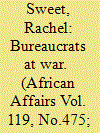

|
|
|
|
|
| Summary/Abstract |
Rebels often portray themselves as state-like to legitimize their rule, yet little is known about their on-the-ground relations with the administrators of state power—official bureaucrats. Drawing on internal armed group records from the Democratic Republic of Congo, this article argues that rebels’ state-like image is more than a simple veneer: Bureaucrats actively sustain state institutions and recruit rebel support during war. It develops a theory of the sources of leverage that bureaucrats use to negotiate with rebels. These interactions entail dual struggles to sustain the structures and symbols of state power and to shape the distribution of control over these institutions during war. On first front, bureaucrats can use their official status to market the symbols of state legitimacy—official certificates, codes, and paperwork—to rebels. On a second, to recruit protection for administrative posts. Pre-existing routines of noncompliance, like parallel taxes and sabotaged information, can use bureaucratic discretion and opacity to limit rebels’ takeover of state structures. This view from the ground demonstrates the real-time continuity of bureaucratic practice through daily paperwork and exchange during war. It contributes to research on rebel governance by illustrating new competitions for wartime statehood and illustrates the empirical practices of states seen as ‘juridical’ or weak.
|
|
|
|
|
|
|
|
|
|
|
|
|
|
|
|
| 2 |
ID:
172582
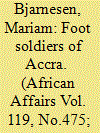

|
|
|
|
|
| Summary/Abstract |
On 31 January 2019, masked men wearing national security apparel allegedly stormed the residence of the National Democratic Congress (NDC) candidate Delali Kwasi Brempong and opened fired on NDC party activists gathering for the by-elections in the Ayawaso West Wuogon electoral district in Ghana’s capital, Accra. The shooting occurred not far from the La Bawaleshie polling station and spread panic among those assembled there to cast their votes. Six persons were officially confirmed injured by gunshots as the masked men were reported to have fired indiscriminately among party activists.1 Videos of the tumultuous election-day scenes went viral: masked men, armed and in uniform, bullet holes, blood-stained walls, and wounded civilians. Frustrated NDC activists and party members were filmed accusing the government of orchestrating the attack as critically injured persons were rushed to the hospital.2 Later in the day, the police assured the public that calm had been restored to the area. Voters and residents of the constituency were encouraged to remain calm and to go about their duties freely and without fear.3 But the reassuring words of the police rang empty for many Ghanaians: with a by-election in the capital turned deadly, and a general election to come only a year later, the Ghanaian electorate seemed to have all the reasons to be fearful.
|
|
|
|
|
|
|
|
|
|
|
|
|
|
|
|
| 3 |
ID:
172578


|
|
|
|
|
| Summary/Abstract |
This article analyses the patterns of poverty, prosperity, and rural transformation in Tanzania through longitudinal research examining livelihoods and asset change in a 20-year period. We argue that some current measures of rural transformation are inadequate for capturing forms of change that matter to rural Africans. We consider in detail some of the processes that lie behind such change in selected locations in Morogoro region, noting the importance of improvements that are taking place through smallholder agriculture. In conclusion, the article discusses the implications of these findings for agricultural policy while also cautioning about the blindness of our methods to other forms of poverty.
|
|
|
|
|
|
|
|
|
|
|
|
|
|
|
|
| 4 |
ID:
172580
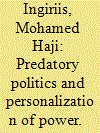

|
|
|
|
|
| Summary/Abstract |
This article investigates the security sector in Somalia, with a focus on the National Intelligence and Security Agency (NISA), a government security unit, involved in the fight against the Al-Shabaab insurgency. This article argues that the historically traumatic legacy of autocratic oppression of the former military regime gives the Somali intelligence agency an infamous reputation that survives today and plays a significant role in the operations of the intelligence agency. Intelligence agents employ tactics from the late Cold War era military regime’s intelligence services, suggesting striking historical continuities of the military regime in practice and performance. The empirical data also shows that NISA is enmeshed in the ‘dirty war’ between the federal government and Al-Shabaab. Not only does the intelligence agency normalize extrajudicial activities to serve the agenda of political authorities and to suppress their critics, but it also financially benefits from arrests without trials. NISA agents harass the public and political opposition groups daily and brutally suppress mass media and freedom of speech, especially in the government-controlled areas in Mogadishu. As the first empirical academic investigation into NISA, the article contributes to broader debates on intelligence, the anthropology of the state, security studies, and institution- and state-building in violent environments.
|
|
|
|
|
|
|
|
|
|
|
|
|
|
|
|
| 5 |
ID:
172581
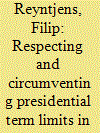

|
|
|
|
|
| Summary/Abstract |
This article offers a survey of political dynamics surrounding the issue of presidential term limits in a large sample of Sub-Saharan African countries over a long period of time. It examines empirically how political regimes have dealt with this issue by observing or circumventing limits, and it links these developments with the democratic quality in the countries at the time they occurred. Beyond legal texts, this study examines the empirical reality of term limits. It finds that effective term limits are less prevalent in practice than in constitutional texts. This is followed by an analysis of the incumbency bias, showing that incumbents who run often win at the election, but that transfers of power are more frequent in the absence of an incumbent. The article then considers the cost-benefit analyses leaders engage in when deciding to stay or to go, as well as the risks of overstaying. Domestic protest and international pressure generally have a limited impact on this choice. The article finally makes clear that political paths across Africa are very divergent, a feature also seen in the longevity of presidents.
|
|
|
|
|
|
|
|
|
|
|
|
|
|
|
|
| 6 |
ID:
172577
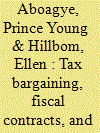

|
|
|
|
|
| Summary/Abstract |
Many Sub-Saharan African countries are unable to generate sufficient tax revenues for public purposes. While it is widely accepted that governments’ ability to tax is shaped by politics, the precise mechanisms through which this relationship takes place in practice remain elusive. Based on a historical analysis of four major tax reforms in Ghana from the 1850s to the late 1990s, this article captures the various ways in which taxpayers negotiate with the state in an attempt to limit the extent of taxation, especially in cases where state reciprocity falls short of what people expect. Our evidence suggests that, far from being a recent development, effective taxation in Ghana has long depended on the ability of the state to convince taxpayers that tax revenues will be used for the public benefit. A history of misappropriation of tax revenues, overt corruption, and profligacy diminished taxpayers’ support for governments’ tax efforts. More generally, the article points to the importance of understanding how tax bargaining works in practice and people’s perceptions of their governments over the long term to overcome resistance to tax reforms.
|
|
|
|
|
|
|
|
|
|
|
|
|
|
|
|
|
|
|
|
|